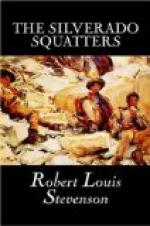In this wild spot, I did not feel the sacredness of ancient cultivation. It was still raw, it was no Marathon, and no Johannisberg; yet the stirring sunlight, and the growing vines, and the vats and bottles in the cavern, made a pleasant music for the mind. Here, also, earth’s cream was being skimmed and garnered; and the London customers can taste, such as it is, the tang of the earth in this green valley. So local, so quintessential is a wine, that it seems the very birds in the verandah might communicate a flavour, and that romantic cellar influence the bottle next to be uncorked in Pimlico, and the smile of jolly Mr. Schram might mantle in the glass.
But these are but experiments. All things in this new land are moving farther on: the wine-vats and the miner’s blasting tools but picket for a night, like Bedouin pavillions; and to-morrow, to fresh woods! This stir of change and these perpetual echoes of the moving footfall, haunt the land. Men move eternally, still chasing Fortune; and, fortune found, still wander. As we drove back to Calistoga, the road lay empty of mere passengers, but its green side was dotted with the camps of travelling families: one cumbered with a great waggonful of household stuff, settlers going to occupy a ranche they had taken up in Mendocino, or perhaps Tehama County; another, a party in dust coats, men and women, whom we found camped in a grove on the roadside, all on pleasure bent, with a Chinaman to cook for them, and who waved their hands to us as we drove by.
CHAPTER IV—THE SCOT ABROAD
A few pages back, I wrote that a man belonged, in these days, to a variety of countries; but the old land is still the true love, the others are but pleasant infidelities. Scotland is indefinable; it has no unity except upon the map. Two languages, many dialects, innumerable forms of piety, and countless local patriotisms and prejudices, part us among ourselves more widely than the extreme east and west of that great continent of America. When I am at home, I feel a man from Glasgow to be something like a rival, a man from Barra to be more than half a foreigner. Yet let us meet in some far country, and, whether we hail from the braes of Manor or the braes of Mar, some ready-made affection joins us on the instant.




